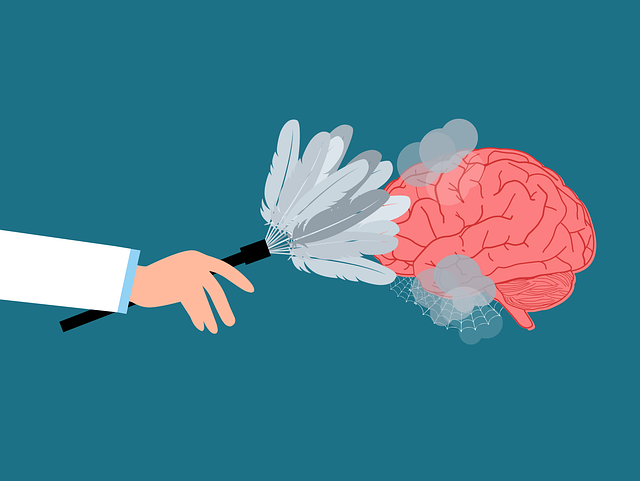Louisville Anger Management Therapy focuses on harnessing positive thinking as a powerful tool for managing anger and stress, preventing burnout, and improving relationships. By teaching clients to reframe negative thoughts and cultivate optimism through emotional intelligence, this therapy enhances mental well-being and life satisfaction. Incorporating daily positive thinking exercises, such as gratitude journaling and mindful meditation, rewire negative thought patterns over time, promoting emotional balance and equanimity in navigating challenges. Tracking progress through goal-setting and self-monitoring enables individuals to adapt their routines for optimal emotional health.
In today’s fast-paced world, cultivating positive thinking is more crucial than ever for mental well-being. This article guides you through a transformative journey towards a happier, healthier mind using a powerful tool: Positive Thinking Exercises (PTEs). From understanding the profound impact of positivity to identifying and challenging negative thought patterns, we’ll explore strategies to integrate PTEs into your routine. Learn how Louisville Anger Management Therapy techniques can enhance these practices for optimal results.
- Understanding Positive Thinking and its Impact
- Identifying Negative Thought Patterns
- Developing a Positive Thinking Exercise Routine
- Incorporating the Exercise into Daily Life
- Tracking Progress and Adjusting the Practice
Understanding Positive Thinking and its Impact

Positive thinking is a powerful tool that can transform one’s outlook on life and significantly impact overall well-being. It involves cultivating an attitude of optimism, focusing on personal strengths, and reframing negative thoughts into more positive ones. This simple yet profound shift in perspective has been linked to improved mental health, increased resilience, and enhanced quality of life. For individuals struggling with anger or experiencing burnout, incorporating positive thinking exercises can be a game-changer.
Louisville Anger Management Therapy emphasizes the role of emotional intelligence and positive thinking in managing anger effectively. By teaching clients to recognize and regulate their emotions, therapy sessions empower them to respond rather than react to stressful situations. This approach not only helps in preventing burnout but also fosters healthier relationships and an overall more positive outlook on life. Positive thinking becomes a strategy to navigate challenges, promoting emotional resilience and a sense of control.
Identifying Negative Thought Patterns

Negative thought patterns are often the root cause of stress, anxiety, and even anger issues. Recognizing these patterns is the first step toward positive change. Many people in Louisville engage in self-talk that’s filled with criticism, doubt, or fear, which can deeply impact their emotional well-being. For instance, someone might find themselves constantly replaying past mistakes or anticipating future catastrophes. Such negative thinking can be a barrier to happiness and success, leading to what some refer to as a ‘mental health crisis’.
Louisville Anger Management Therapy offers valuable tools for identifying these patterns through comprehensive mental health education programs designed to enhance communication strategies. By understanding the specific triggers and recurring themes in their thought processes, individuals can begin to reframe negative thoughts into more positive and realistic ones. This transformation is key to promoting emotional well-being and fostering healthier relationships both personally and professionally.
Developing a Positive Thinking Exercise Routine

Developing a Positive Thinking Exercise Routine can be a transformative step toward enhancing your mental well-being and overall quality of life, especially for those seeking support through Louisville Anger Management Therapy or Trauma Support Services. It’s not just about changing your thoughts but also cultivating a self-care routine that promotes resilience and emotional balance. Start by dedicating a specific time each day—whether it’s early morning or before bed—for this practice. Consistency is key; regular engagement in positive thinking exercises can help rewire negative thought patterns over time, making them more manageable and less frequent.
Incorporate various techniques such as gratitude journaling, where you note down three things you’re thankful for each day, or practice mindful meditation to calm the mind. Additionally, engage in activities that bring joy and relaxation, be it a hobby like painting or spending quality time with loved ones. These self-care practices not only contribute to burnout prevention but also empower individuals to navigate life’s challenges with greater equanimity.
Incorporating the Exercise into Daily Life

Incorporating a positive thinking exercise into your daily routine can significantly enhance emotional well-being promotion techniques and contribute to Depression Prevention efforts. Louisville Anger Management Therapy offers practical strategies for cultivating a more optimistic mindset, which can be seamlessly integrated into one’s Self-Care Routine Development for Better Mental Health. By dedicating just a few minutes each day to this practice, individuals can experience a profound shift in their overall mental health and resilience.
This simple yet powerful exercise encourages folks to reflect on and reframe negative thoughts, fostering a more positive perspective. It’s as easy as taking a moment each morning or evening to jot down three things you’re grateful for—be it a beautiful sunset, a supportive friend, or even the warmth of your bed. This practice not only helps navigate challenging emotions but also serves as a gentle reminder of life’s many blessings, fostering a sense of contentment and inner peace.
Tracking Progress and Adjusting the Practice

Tracking progress is a vital part of any positive thinking exercise implementation, especially when considering Louisville Anger Management Therapy and Trauma Support Services. Regularly evaluating your thoughts, emotions, and behaviors can help identify patterns and areas for improvement. This process allows individuals to see their growth over time, providing motivation to continue the practice. By setting specific goals related to emotional well-being promotion techniques, one can tailor their self-care routine development for better mental health.
For instance, if someone aims to reduce stress levels, tracking progress might involve logging daily stressors and coping strategies used. This practice enables them to recognize when certain thoughts or actions are counterproductive and make necessary adjustments. It’s about learning from experiences, adapting the self-care routine, and ensuring that each step taken aligns with the individual’s unique journey towards positive thinking and emotional balance.
Implementing positive thinking exercises as part of your daily routine can significantly enhance mental well-being. By understanding the power of thought, identifying negative patterns, and adopting a structured practice, individuals in Louisville can effectively manage anger and cultivate a more optimistic outlook. Regular engagement with these exercises allows for gradual progress tracking, enabling adjustments to tailor the practice to individual needs. Embracing this transformative journey not only improves overall happiness but also fosters resilience in navigating life’s challenges, as evidenced by the success stories of many who have benefited from Louisville Anger Management Therapy.














